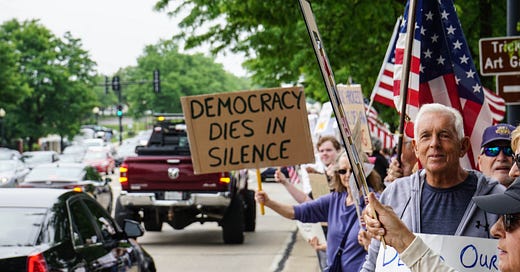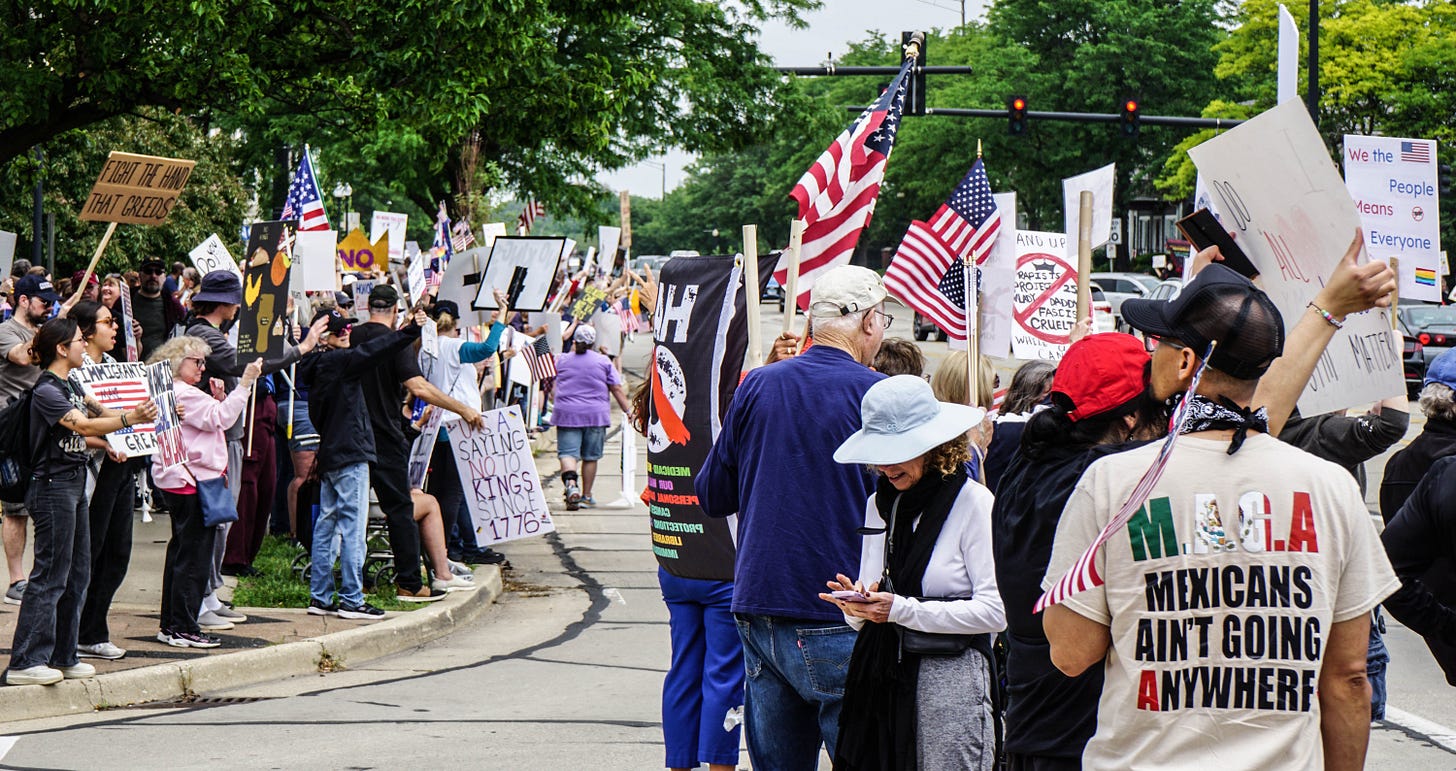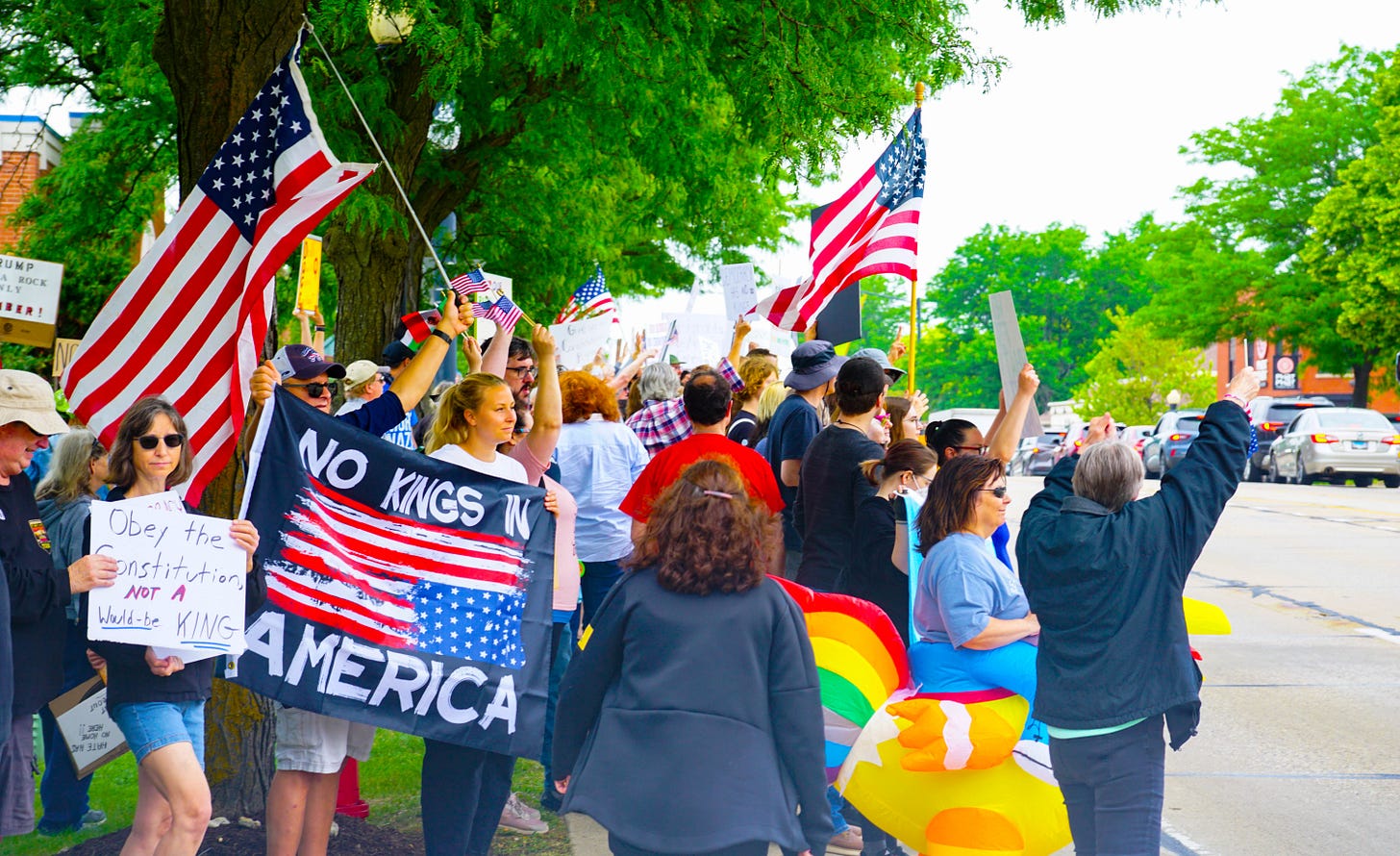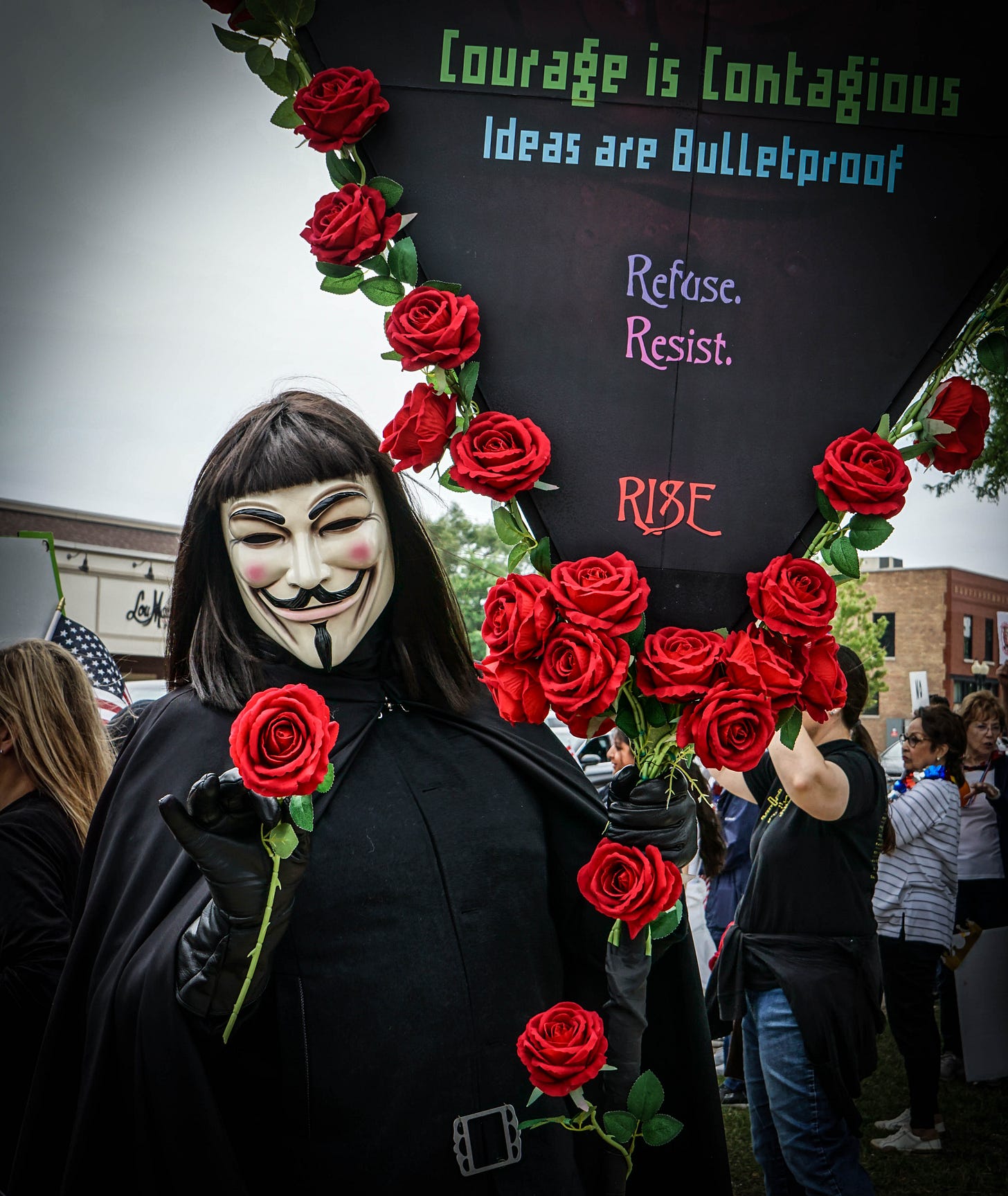No Kings Day
I would like to start by saying that Saturday’s “No Kings” protest was a historic day in America. With somewhere between 5-7 million people out on the streets, it was the largest single day protest in this country every. Bonus points for Trump’s military parade in DC looking sad and poorly attended by comparison.
Much gratitude to all who participated, and showed them what it actually means to demonstrate power “peacefully and patriotically” - you are what makes America great.
I think it’s worth calling attention to an important milestone in our national struggle. Today marks the 10th anniversary of Trump’s descent down the golden escalator to announce his run for the presidency, a speech that instantly gained notoriety for his obscenely hateful demagoguing of Mexicans living in this country. And here we are today, with the ICE raids trampling not just on the lives of undocumented residents who are otherwise rule-abiding residents, but also the rights of US citizens who just happen to look like they might be “an illegal.” Anyone who acts surprised at this is being disingenuous to an incredible degree - the signs were all there from Day 1.
It was, however, encouraging to attend the protests this weekend. I am 30 years old. A decade into the Trump Years, this era has claimed a whole third of my life to this point. It is exhausting, and terribly depressing. I can only imagine what I would rather be spending my time with in a more normal world. And yet, I like so many others, persist, in large part because of the strength and convictions of the folks lighting the way for us. It can be easy to feel isolated in these times, like you’re on an island shouting out warnings to ships that indifferently pass by as they follow the siren song of wishing to normalize or downplay the catastrophe waiting in the waters ahead. But showing up to the protest, and finding yourself surprised by how many others were there, standing shoulder-to-shoulder in common cause because of a common capacity to care - you don’t feel so alone when you go back to the daily grind of keeping the work going to save our democracy for people like that.
There is a joy in finding “your people.” We only win this by encouraging each other.
A Question of Leadership
In response to my piece about protesting last week, a friend brought up a really good point that I thought would be worth ruminating on:
A question that's been kind of weighing on me. Where are our leaders? I don't think I could point to a single a person that we can rally behind. There's people who are doing good work and stuff, but.... Can we do this without someone specific leading us out of this?
And, honestly, I don’t think we’re going to know the answer to that until we look back on this period in history. There have been some monumental resistance and activist movements throughout history that didn’t have a central leading figure. There have been many others which succeeded only because of a few key individuals.
So, instead of attempting to directly answer the question, I’m going to try to provide a framework for thinking about the ways in which “leaders” are useful and the ways in which political movements can benefit from not being tied to individual persons.
The Case for Central Leadership
I think one of the biggest ways in which having a leading figure in a political movement is that it helps define what the movement is about. Having a figurehead - or a core leadership team composed of a handful of individuals - who can articulate what the cause is and what its goals are ensures a type of consistency both within the ranks of the movement and in the messaging to the people you are trying to convince.
When we think about the Civil Rights era today, we often do so in terms of Martin Luther King Jr. (or Malcom X if you’re inclined to a more militant view of politics). MLK was not the only person organizing the marches and sit-ins against the segregationist regime - he had the whole of the Southern Christian Leadership Conference working tirelessly with him across several states - but it’s his speeches, interviews, and letters that we remember the most. If you want a kid in school to understand “What was the Civil Rights Movement about?” - you can direct them to any of the stuff that King said or wrote and they’ll get a pretty decent idea of what the principles of the movement were and what goals they were striving for. The same could be said for adults living in MLK’s time as well. When they turned on the TV that evening and saw him making a speech or doing an interview, the aims of the movement were clear, even if all you were doing was paying attention to the evening news and not searching out more information on your own.
A leading figure helps set the tone for the way in which protest happens. Mahatma Gandhi is often considered to be the founding father of the non-violent resistance approach to mass protest movements, using himself as the model for peacefully breaking the most onerous laws of colonial rule - such as the salt tax - and allowing himself to get arrested for these actions, thus setting a precedent for others to follow in his footsteps, both in India and abroad. In America, Cesar Chavez was able to popularize support for the California farm workers by framing it not just as matter of union politics, but part of a broader moral framework that made their cause righteous in the eyes of the grocery store consumers who assisted them with boycotts.
Another benefit about having a clearly defined protest leader is that they can separate the legitimate protestors from the troublemakers in the public perception. Having a recognizable face who can say “These people represent us. These other people do not.” goes a long way in signaling to observers that any footage they might see of rioters and looters are different people than the folks who make up your movement.
And finally, if the end goal of a political movement is achieving policy concessions, then it needs a leader (or team of leaders) who can speak for the movement and negotiate with the powers-that-be. One of the reasons that the mass protest movements of the 2010’s like Occupy Wall Street and Black Live Matter failed, even while having lots of people show up and a groundswell of public opinion on their side, was because there wasn’t a clear group of people who spoke for the movement as a whole and could who make demands and concessions on their behalf in meetings with the policy-makers in charge.
In the case of America’s current situation, we have to consider that this is not a protest movement looking to bargain for policy concessions. First of all, unlike conventional political figures, Donald Trump is not looking for a way to de-escalate tensions while saving face - there is no benevolent side of the administration to appeal to. Secondly, even if he were to promise some sort of reduction of his worst policies, the man is the world’s most famous liar who always backstabs the people he makes deals with - it’s pointless to “negotiate” with him.
Elevating a “leader” in the anti-Trump movement serves only one purpose from a policy perspective - putting forth a candidate who can defeat him in an election and reclaim the presidency on the behalf of the American people and the Constitution.
But that’s 2028 (yikes), or at the earliest the 2026 midterm elections as a testing ground for potential leading candidates. In the meantime, though, while we aren’t having elections, we are having protests. And it would probably be good to have a couple leaders emerge in being the public face for what the protests are about, and what form the protests should take. Bernie and AOC are doing a good job of being the face of the anti-oligarchy movement. Ezra Levin and Leah Greenberg are doing a good job of providing the internal leadership structure over at Indivisible for determining clear goals and strategy. Beyond that, though, we’re going to need protest movements emerge around all sorts of threats to our society, and for those movements to have a clear organizational structure where the leaders can coordinate with each other to collaborate on logistics and messaging when the causes they represent overlap.
The Case for Not Having a Central Figure
All this being said. I think it’s also worth considering that the forces opposing Trumpism and MAGA probably don’t need a singular leading revolutionary figure to rally around (aside from getting behind a 2028 candidate who can win).
In part, this is because America is (still at the time of this writing) a liberal society - in the classical sense of that word. Having a singular charismatic figure leading “The Resistance” works when its an occupied country or an authoritarian state that people are trying to overthrow (think DeGaulle in France, for example) because politics at that point have pretty much been flattened to collaboration with, or opposition against, the regime. Despite the current times of troubles, however, Americans are still relatively “free” compared to folks in other regime states. They have a lot more latitude to not get on board with a political movement if they don’t find the people leading it to be appealing. In order to get a majority of the population to stand firmly in opposition to Trumpism, you need to have a variety of options for them to find a political home, and as long as there’s the shared goal of stopping MAGA, it doesn’t really matter where that is.
Today, we might look back on someone like Pope John Paul II as being the key figure which inspired and aided the Polish Solidarity movement of the 1980’s, but the reality of it was that it was a type of politics which was pulled from a diverse range of society - Catholics and atheists, businessmen and socialists, globalist liberals and nationalist conservatives - groups of people who in just about every other matter in life would have little in common beyond their universal resentment of being a client state of the Soviet Union, all able to join together because they were able to work in concert without having to give up the identity groups they belonged to. The Solidarity movement succeeded because there was no one ideology that everyone had to rally to. People got on board for their own reasons, and that was good enough. Of course, you still had figures like Lech Wałęsa organizing and coordinating all these efforts, so this isn’t to say that “leadership” isn’t required. Just that it doesn’t need to flow from a singular personality that guides the whole movement.
And not having a singular figure from which the movement flows also makes it harder to kill, literally or figuratively. What is the state of political opposition to Putin in Russia these days? Considerably diminished since the death of Alexei Navalny in February of 2024, and there have been no notable mass protests inside Russia for over a year now. One not need to actually kill the opposition leader, either. A successful character assassination will serve to not only discredit them, but the movement in which they lead if these things are tied too closely together. There is value in having a political movement that builds momentum naturally and then chooses leaders from within its ranks to represent them, rather than having the movement stem from an individual personality which it is difficult to separate from if that person becomes a liability.
There’s a reason why V wears the mask, after all. Because it’s not really about him, but rather the principles that he’s supposed to represent, the principles that any one of us in the crowd could have as well.








